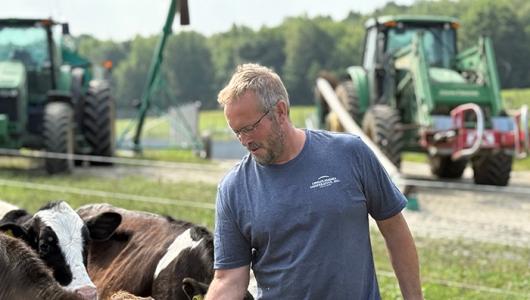This Friday meet Peter Jordan, of Blue Ridge Farms LLC in Waltham, Maine, where he produces wild blueberries and timber. Blueberries are iconic in Peter’s area of “Downeast” Maine and are a labor of love and tradition for many Maine farmers. A third-generation farmer, Peter took over the sole management of the farm when his father retired, and although he has seen the blueberry industry go through ups and downs, he is determined to keep with his family tradition.

“The wild blueberries are much smaller than regular blueberries,” said Peter. “There are about 47 different clones of wild berries in my area. Some are very sweet, and some are sour, but when you mix them all together the flavors just come together wonderfully.”
The Path to Sustainability
Throughout the years, Peter and his family have produced wild (lowbush) blueberries and managed their farm’s woodlot to produce timber. Looking to streamline their operation, Peter reached out to his local USDA Service Center.
He began working with USDA’s Natural Resource Conservation Service (NRCS) to become more sustainable and improve soil quality and plant viability. Peter transitioned from burning his fields each year for weed management and has implemented practices for rock removal to help him achieve his goals. He established obstruction removal and tree shrub pruning conservation practices through the Environmental Quality Incentives Program, removing rocks to allow a flail mower to work the fields. Mowing after harvest is an alternative way to manage weed growth and prune the plants.

“My family has been removing rocks from these fields for years,” said Peter. “My grandparents pulled rocks with a horse and a wagon and spent days on days removing rocks. Now, I can do the same work in just minutes with my equipment.”
Peter diversified his operation with the addition of a sawmill with a farm operating loan from USDA’s Farm Service Agency (FSA). Operating loans are a valuable resource to start, maintain, and strengthen a farm or ranch. They can be used to purchase livestock, seed, and equipment, and can also cover farm operating costs and family living expenses while a farm gets up and running.
When timber is harvested, tree limbs and treetops are removed and left on the forest floor to decompose, adding nutrients to the soil, and providing habitat for insects and wildlife. When the logs are milled, the round slabs are retained to be used as woodchip medium for mulch on the blueberry fields. The sawmill produces rough-cut slab boards.

The Perfect Recipe
Another operating loan from FSA helped Peter upgrade the farm tractor and purchase a lumber planer, allowing Blue Ridge Farms to further expand their lumber market to offer custom milled, finished lumber. The sawdust is collected and retained for use as mulch.
In Maine, wild berries thrive in acidic sandy soil, so the woodchips and sawdust are suitable for this crop. Mulching blueberry fields helps mitigate drought conditions and helps prevent soil erosion where there are bare, exposed sections in between his plants; the mulch helps retain the moisture and nutrients in the soil. It also helps prevent weed growth while promoting rhizome expansion for the blueberry plants. Mulching has improved Peter’s blueberry yields, so that even in a drought year he is able to produce a quality crop.
“It’s like a recipe,” Peter explained, “the lack of, or overabundance of one ingredient will throw your crop out of whack. Either too much rain…and then the next year not enough rain. You do your best to try and guess what will be needed.”

More Information
Visit local farms, ranches, forests, and resource areas through our Fridays on the Farm stories. Meet farmers, producers, and landowners who are working to improve their operations with USDA programs.
USDA offers a variety of risk management, disaster assistance, loan, and conservation programs to help producers weather ups and downs in the market and recover from natural disasters as well as invest in improvements to their operations. Learn about additional programs.
For more information about USDA programs and services, contact your local USDA service center.
For more information about this story, contact Mary Anne Coffin, communications coordinator for FSA in Maine.


